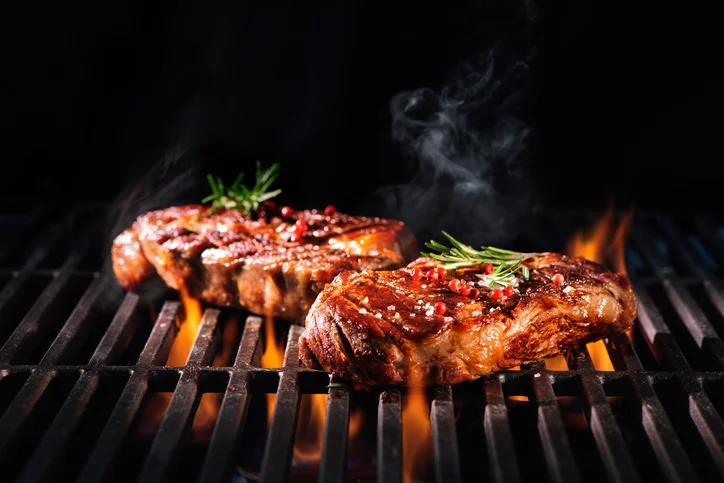Healthy grilling 101
/Grilling season is in full swing and there’s nothing that quite distinguishes summer from all other seasons like the sounds, smells and tantalizing taste of barbequed meat. Before you get set to grilling nonstop know there can be some health downsides to this mainstream Americana ritual. It doesn’t mean you have to forego grilling just be smart about how to grill as healthy as possible.
Research has suggested a link between grilled meat, poultry, and fish and the possible development of cancer. There are a couple of caveats in regards to grilling that everyone needs to consider:
1. Grilling means many of us will end up eating very high-fat meats and sausages. This means excess calories, fat, saturated fat, and cholesterol that do not promote a healthy way of eating. Choose leaner cuts of meat keeping the portion sizes reasonable around 3-6 ounces.
2. There’s the risk of consuming two potentially cancer-causing compounds. One is called polycyclic aromatic hydrocarbons (PAH’s). PAHs form when fat from the meat drips onto the hot coals or grill element. They are then deposited onto the food due to flare-ups from the flames and rising smoke. Charred pieces on meat can contain PAHs.
The second potentially cancer-causing compound is heterocyclic amines (HCAs) which are produced when red meat, poultry, and fish meet high-heat cooking like grilling and broiling.
Both PAHs and HCAs have been shown to cause tumors in animals and possibly increase the risk of cancers of the breast, colon, stomach, and prostate in humans.
By making a few smart grilling modifications reducing the formation of PAHs and HCAs, barbequed meats can still be enjoyed. Here’s how:
· Marinate meats before grilling
Researchers at Kansas State University used three different mixtures of oil, vinegar, and herbs and spices to marinate steaks. Marinated steaks carcinogens were reduced by 57 to 87 percent compared to unmarinated steaks. Scientists believe that the marinade ingredients themselves seem to prevent HCA formation along with creating a protective barrier between the meat’s proteins and the heat of the grill. Typical marinade ingredients include vinegar, citrus juice, herbs, spices and oils such as olive oil that appear to contribute to the prevention of HCA formation. About a half cup of marinade is needed for every pound of meat. Total immersion is not necessary but the meat should be turned occasionally so that all surfaces are in contact with the marinade long enough to be beneficial.
· Trim the fat
When you trim fat from meat before grilling, there will be less fat dripping onto the flames. That means fewer flare-ups; flareups can contain PACs that get deposited onto the food through flare-ups and smoke.
· Shorten grill time
The less time spent on the grill, the less exposure to smoke and flames. Small meat portions like kebobs require a shorter cooking time. Fish will cook much faster than beef or chicken. Pre-cooking meats in a microwave for two to five minutes can significantly help eliminate 90 percent of HCAs
· Avoid processed meats
Just about everybody loves to eat processed meats like hot dogs, sausage, or bratwursts. Unfortunately, cancer-causing substances are formed when these meats are preserved by smoking, curing, salting or by the addition of preservatives. In addition, eating processed meats can do damage to your DNA, increasing your risk of colorectal cancer, according to the American Institute for Cancer Research. It’s best to limit your intake of these meats to a bare minimum or avoid them altogether.
· Ban burnt or charred meat, poultry, and fish
For some individuals, burnt or charred pieces are their favorite part of grilled meats. But before biting into those crunchy burnt pieces, consider they are caused by cooking meat at a high temperature resulting in PAHs and HCAs to form, increasing the risk of pancreatic, colon, or stomach cancers. The Kansas Beef Council recommends grilling at medium heat since high heat can overcook or char the meat. If using a charcoal grill, spread the coals in a single layer. When the coals are no longer flaming and are ash-colored, it should be at medium heat. If using a gas grill, check the owner’s manual for specific information on medium heat as gas grills can vary quite a bit. Always remove burnt or charred pieces from food.
· Consider grilling fruits and veggies instead
Grilled fruits and veggies are a terrific alternative to traditional methods of cooking produce and they produce no HCAs. It’s fast, easy and a nice change of pace from how you normally eat produce. Plant-based foods are associated with lower risks of cancer and if you normally avoid produce, this can be one way of getting the recommended number of servings. Try out these recipe ideas for grilling your favorite veggies.
· Keep your grill gleaming
A clean grill is a happy grill and this means you need to clean the grill both before and after using it. Scrubbing the grill to a shiny gleam reduces the buildup of carcinogens and helps the food taste much better too. Not cleaning the grill will mean you run the risk of transferring leftover chemicals onto food that next time you barbeque.
Get grilling confidently
Grilling is an enjoyable pastime and as long as it’s done confidently and safely without compromising your health, it can be done on a regular basis. Follow the tips in this article and you can be a master chef in your backyard of grilling a variety of meat, poultry, fish and don’t forget fruits and veggies. For more information on grilling and recipes, visit the Texas Beef Council and check out one sample of many marinade recipes found at their website.

